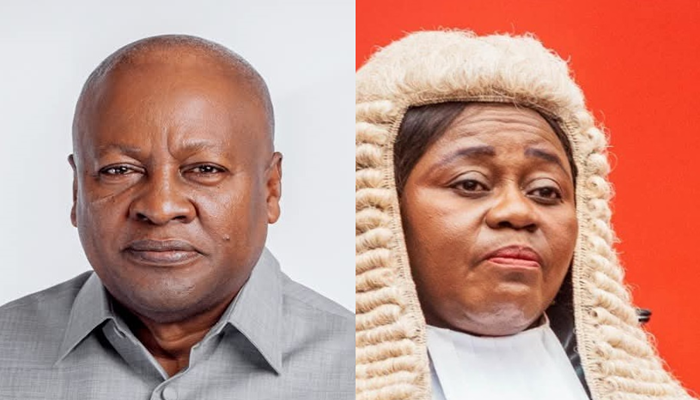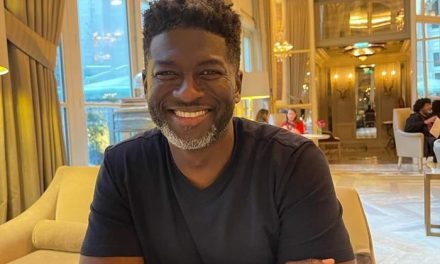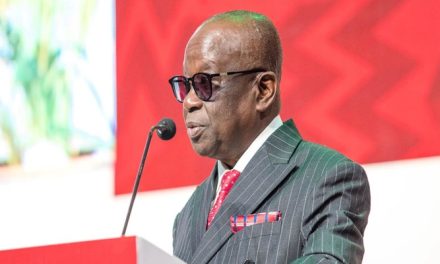President John Dramani Mahama’s decision to suspend Chief Justice Gertrude Torkornoo marked an unprecedented moment in Ghana’s judicial history.
The decision has sparked heated debate across the country further deepening division of the country on partisan lines.
Reactions of National Democratic Congress (NDC) party leaders and their supporters is evidence that they see the move to remove the Chief Justice as revenge for the removal of former Electoral Commission (EC) Chairperson, Charlotte Osei, appointed by President Mahama during his first term, along with two of her fellow commissioners, Georgina Opoku Amankwa and “Amadu Sulley,” under former President Nana Akufo-Addo.
Acting on the advice of the Council of State, and invoking Article 146(10) of the 1992 Constitution, the President issued a warrant that removed the nation’s highest judicial officer from her duties with immediate effect.
A statement issued by Felix Kwakye Ofosu, Minister for Government Communications and Spokesperson for the President, said the suspension is to remain in force pending the outcome of a formal inquiry into serious allegations that have cast a shadow over the Chief Justice’s tenure.
Simultaneously, President Mahama determined, pursuant to Article 146(6) of the Constitution, that a prima facie case exists against Justice Torkornoo based on three petitions lodged since her elevation to the bench.
To investigate these allegations, he appointed a five‑member committee, chaired by Gabriel Scott Pwamang, a former People’s National Convention (PNC) General Secretary and the only serving Supreme Court Judge appointed during the first term of the John Mahama government in 2015.
Its members include Supreme Court Justice Samuel Kwame Adibu‑Asiedu; Daniel Yaw Domelevo, the former Auditor‑General who was appointed by President Mahama but exited office over two separate dates of birth controversy and a is current member of Operation Recover All Loot (ORAL), Major Flora Bazwaanura Dalugo of the Ghana Armed Forces; and Professor James Sefah Dzisah, Associate Professor at the University of Ghana.
The first petition alleges that during her time as a Court of Appeal judge, Justice Torkornoo directed the court’s administrative arm to award printing and stationery contracts to companies linked to her personal associates, bypassing competitive tender.
Petitioners claim that over the course of two fiscal years, contracts were steered toward these firms, in contravention of both the Public Procurement Act and the Judicial Service purchasing regulations.
According to those who brought the complaint, this practice amounted to a conflict of interest and deprived the state of value for money, raising troubling questions about accountability at the highest levels of the judiciary.
A second petition, filed by a small coalition of private practitioners, accuses Justice Torkornoo of questionable recusal and case‑management practices.
According to their submission, she repeatedly sat on interlocutory matters in which one of the parties was represented by an attorney who had previously clerked for her, or where the dispute involved institutions she once advised.
This, they argue, created a perception of bias. They further noted that in at least two such cases, interlocutory rulings under her direction were overturned on appeal—a development that, in their view, eroded public confidence in the impartial administration of justice.
The third petition challenges the integrity of the promotion exercise that elevated Justice Torkornoo from the Court of Appeal to the office of Chief Justice.
A network of magistrates and lower‑court judges contends that the Judicial Council’s selection committee, influenced by her professed “reform‑agenda commitments,” departed from the statutory short‑listing criteria of seniority, performance evaluations, and disciplinary records.
They maintain that the process was skewed toward a predetermined outcome, in breach of the Judicial Service Regulations, and that this undermined the meritocratic principles meant to govern promotions within the judiciary.
Another petition also alleged that public funds were used to purchase air tickets for the Chief Justice’s spouse and children.
The Judicial Service budget—financed by public revenue—was charged for international travel ostensibly described as “courtesy visits” or “official engagements.”
The petitioners argue that the Judicial Service’s own regulations permit subsidized travel only for a judicial officer’s official duties and, under exceptional hardship circumstances, for dependents—conditions they say were not met.
The outcome of this inquiry will determine whether Chief Justice Torkornoo returns to her post or faces further disciplinary or removal proceedings.
For now, an Acting Chief Justice Baffoe Bonnie would preside over the Supreme Court, and the nation watches closely.
Former A-G rubbishes suspension
In a firm and impassioned reaction to the unfolding controversy surrounding the suspension of Chief Justice Gertrude Torkornoo, former Deputy Attorney-General Diana Asonaba Dapaah delivered a blistering critique of the rationale behind the move.
She expressed deep concern that anyone could find a prima facie case in the petitions submitted against the Chief Justice, warning that such a conclusion should deeply alarm every right-thinking Ghanaian.
“How can a decision made by a CJ as part of a panel of at least five justices be the basis for this kind of judgment?” she questioned. “And what of the other justices involved—some of whom now sit on the very committee investigating her?”
Dapaah further criticized the inclusion of old administrative decisions, including cases of staff dismissals, as grounds for removal.
She found it baffling that such issues—some dating back years before Justice Torkornoo assumed the CJ role—could be elevated to the level of misconduct.
“If those affected felt wronged,” she argued, “they could have sought legal remedies. How does this amount to a case for removal?”
The former Deputy Attorney-General also took issue with the claim that the CJ is “politically exposed,” dismissing it as an empty phrase.
“By that logic,” she said, “every judge in Ghana is politically exposed. Their appointments pass through Parliament, the Judicial Council, the Ghana Bar Association, and ultimately the President.”
She went further to draw attention to what she believes is a larger political agenda at play.
“We have a President who has already signaled his intention to interfere with the judiciary, and now we’re expected to believe this suspension is purely based on merit? The petitions are nothing but frivolous.”
Madam Dapaah also addressed what she called misinformation about the Chief Justice’s travel entitlements.
Refuting claims made by critics referencing a supposed “page 37” of the travel policy, she urged the public to consult the actual policy crafted under Article 71 of the Constitution and ratified by the appropriate emoluments committee.
She pointed out that the policy explicitly allows the CJ to undertake unlimited official travel with a spouse or person of choice, and even permits two personal trips annually—fully funded by the Judicial Service.
“Why should the judiciary—an equal arm of government—be treated with such contempt?” she asked. “Do we scrutinize the travel entourages of the other arms this way?”
In a powerful conclusion, Diana Asonaba Dapaah made it clear that this moment transcends the individual. “This is not just a Gertrude Torkornoo fight,” she declared.
“This is a fight for every judge in Ghana, a fight for the memory of the three murdered judges whose legacies are now being mocked, and a fight for the very soul of our democracy.”
Internal conflict and the fall of 3 EC Commissioners
The removal of Madam Osei, Madam Amankwa, and Sulley from the EC stemmed from deep-rooted internal conflict, marked by mutual accusations of misconduct, mismanagement, and breaches of procedure that crippled the institution’s operations.
Charlotte Osei’s Allegations
In a letter dated August 18, 2018, Madam Osei petitioned President Mahama to remove her two deputies—Madam Amankwa and Sulley—citing dereliction of duty, insubordination, and conflicts of interest.
She accused Madam Amankwa of failing to perform key responsibilities related to human resources and election logistics, including delayed staff deployment before by-elections.
Madam Osei further alleged that Madam Amankwa skipped essential meetings and issued unauthorized directives that undermined the Commission’s unity and effectiveness.
Against Sulley, Madam Osei leveled more severe charges, including awarding contracts without competitive tender—an alleged breach of the Public Procurement Act.
She also accused him of leaking sensitive election data, such as voter rolls and polling station maps, to partisan groups, thus compromising the Commission’s neutrality and security. Additionally, Sulley was said to have created unauthorized polling stations without proper clearance, threatening the credibility of the electoral process.
Counter-allegations by Madam Amankwa
In her defense, Madam Amankwa responded with equally serious accusations against Madam Osei, centered on her management style and disregard for due process.
She claimed Madam Osei sidelined other commissioners in decision-making, violating the EC’s constitutionally mandated collaborative governance model.
Madam Amankwa also alleged that Madam Osei awarded contracts—particularly one for biometric voter data processing—without going through the proper tendering process.
According to her, these procurement violations were as grave as those Madam Osei accused others of committing.
Additionally, she criticized Madam Osei for inconsistent disciplinary practices—punishing junior staff harshly while ignoring serious infractions by senior officials, notably a senior IT staffer accused of leaking data.
Sulley’s response
Sulley also launched a series of counter-allegations, painting Osei as a leader who abused her office and disregarded institutional protocols.
He accused her of awarding major contracts, including a GH₵3.9 million renovation of the EC headquarters, without prior approval, violating procurement laws.
He criticized Madam Osei for making unilateral staffing and procurement decisions, portraying her leadership style as autocratic.
Sulley also claimed she created confusion by establishing parallel reporting lines—encouraging staff to bypass supervisors and report directly to her.
One of Sulley’s most damaging accusations was that Madam Osei compromised the EC’s neutrality.
He alleged she held private meetings with political leaders without notifying other commissioners, casting doubt on the Commission’s impartiality during politically sensitive periods.
The mutual accusations from all three commissioners painted a picture of an institution plagued by dysfunction at its highest levels.
By ELVIS DARKO, Accra





